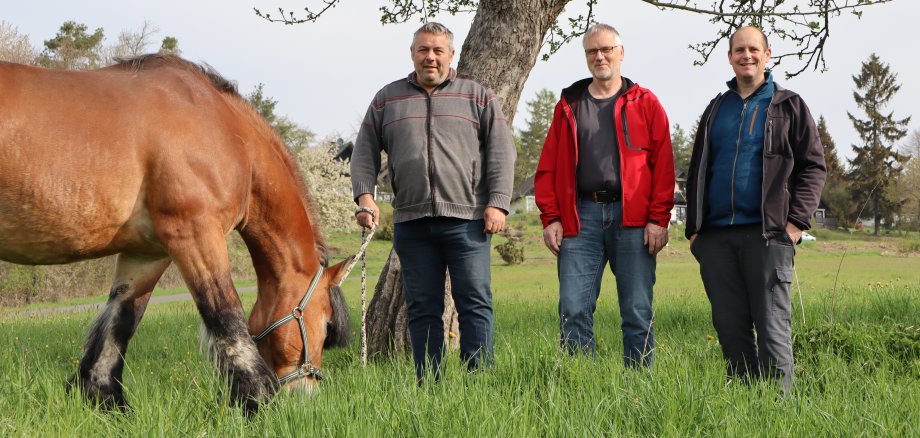Old livestock breeds: New podcast of the eco-model region online
"Old livestock breeds - why are they worth preserving?" is the topic of the latest podcast episode of the Waldeck-Frankenberg eco-model region. The podcast goes online on 8 September and provides answers to the topic question. Conservationist and animal keeper Herbert Ruhwedel, Arche-Hof Kellerwald carter and animal welfare activist Ralf Finke and Managing Director of Landschaftspflegeverband Waldeck-Frankenberg e. V. Carsten Müller also explain in the contribution why rare livestock breeds are so important for regional landscape conservation.
Who today still knows the spectacled sheep, the Hinterwald cow, the Harz goat, the Vorwerk chicken - which, by the way, has nothing to do with a well-known brand of hoover - the large Spitz or the German Peking duck? In the past, these animal bipeds and quadrupeds populated many a farm, were widespread on farms and in domestic gardens. Today they are on the Red List of animal breeds that will soon be extinct if they are not continued to be bred.
According to the Society for the Preservation of Old and Endangered Breeds of Domestic Animals, at least one farm animal breed dies out every week worldwide. This means that valuable genetic potential is lost. There is also something to learn about this in the new podcast episode of the eco-model region - it's worth listening to!
Anyone who is interested in taking a look at specimens of the endangered breeds: On 18 September there will be a good opportunity to do so in Frankenau at the Kellerwaldhalle from 11 am - 6 pm. The Archetag taking place there with a direct marketing fair full of regional, seasonal and organic products not only has a great supporting programme, but also an exhibition of the endangered domestic animal breeds.
In addition to this podcast episode, 17 other podcasts of the eco-model regions are already online, from "Diversity in the field!" to "Organic farmer as a dream job!" and "Regional organic gastronomy - makes sense!
Caption
(from left to right) Ralf Finke, here with the Rhenish-German cold-blood gelding Lukas, Herbert Ruhwedel and Carsten Müller explain the importance of old livestock breeds in the new podcast episode of the Ecomodel Region.
Photo: Ecomodel Region Waldeck-Frankenberg
Background: Ecomodel regions
Hessen has been an Ecomodel Land since 2021. As an "umbrella brand", the Ecomodel Land Hessen connects the 13 Ecomodel regions, which form a comprehensive network across the whole of Hessen and integrate all districts. The eco-model regions are a component of the Hessian Eco Action Plan and are funded by the Hessian Ministry for the Environment, Climate Protection, Agriculture and Consumer Protection.
The task of the model regions is to develop projects and measures that increase the share of organically and regionally produced food. This is intended to meet the growing demand for organically produced food more from local agriculture and to raise consumer awareness of regional cycles and organically produced food. The eco-model regions are also contact points for agriculture, food production, food processing and trade. By networking these actors, regional marketing is to be strengthened and domestic value chains established.
